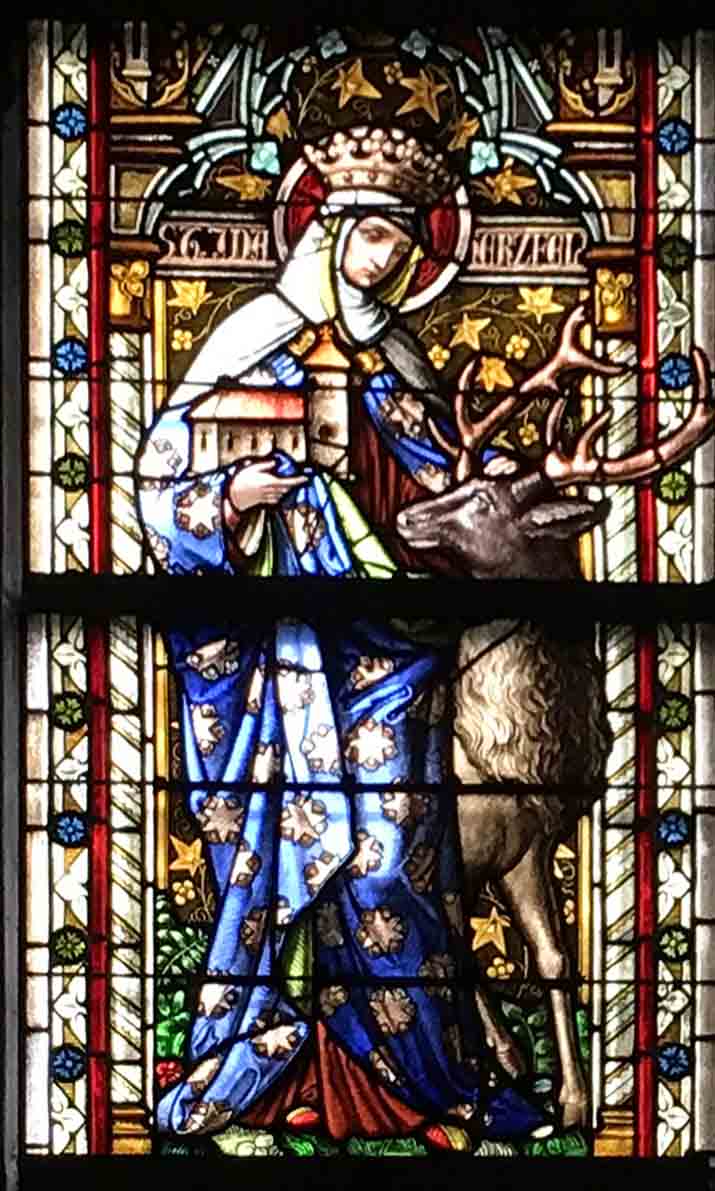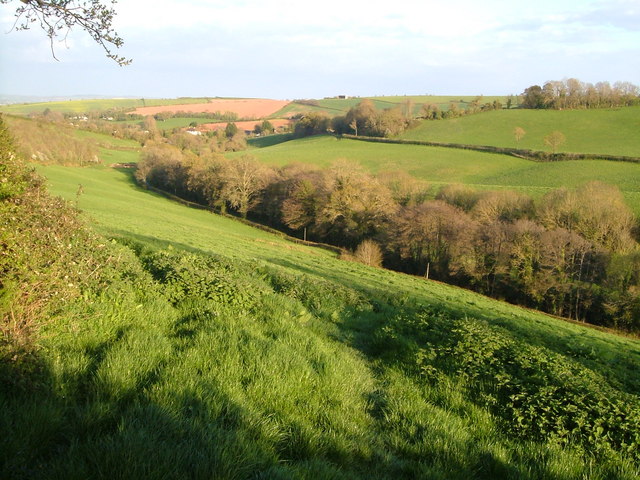|
Ide, Devon
Ide is a village in Devon, England, just under southwest of Exeter. The village church is dedicated to the German Saint Ida of Herzfeld and was rebuilt in 1834. The majority of the village is separated from suburban Exeter by the A30 dual carriageway. Whilst it was controversial at the time of construction, the bypass has effectively enabled Ide to maintain an independent identity. The parish boundaries extend a short distance over the A30 and several notable buildings within the parish, including Ide House and the Twisted Oak pub, are located on the Exeter side. The village has two pubs: the Poacher's Inn and the Huntsman Inn. To the northwest of the village at College Lane, a ford crosses the Fordland Brook. Above Ide on a hilltop at SX8888 is the site of a Roman fortlet or signal station. Ide Halt railway station Ide Halt was a railway station serving Ide, a small village in Devon, England located on the Teign Valley Line between Newton Abbot and Exeter. His ... [...More Info...] [...Related Items...] OR: [Wikipedia] [Google] [Baidu] |
Devon
Devon ( , historically known as Devonshire , ) is a ceremonial and non-metropolitan county in South West England. The most populous settlement in Devon is the city of Plymouth, followed by Devon's county town, the city of Exeter. Devon is a coastal county with cliffs and sandy beaches. Home to the largest open space in southern England, Dartmoor (), the county is predominately rural and has a relatively low population density for an English county. The county is bordered by Somerset to the north east, Dorset to the east, and Cornwall to the west. The county is split into the non-metropolitan districts of East Devon, Mid Devon, North Devon, South Hams, Teignbridge, Torridge, West Devon, Exeter, and the unitary authority areas of Plymouth, and Torbay. Combined as a ceremonial county, Devon's area is and its population is about 1.2 million. Devon derives its name from Dumnonia (the shift from ''m'' to ''v'' is a typical Celtic consonant shift). During ... [...More Info...] [...Related Items...] OR: [Wikipedia] [Google] [Baidu] |
Exeter
Exeter () is a city in Devon, South West England. It is situated on the River Exe, approximately northeast of Plymouth and southwest of Bristol. In Roman Britain, Exeter was established as the base of Legio II Augusta under the personal command of Vespasian. Exeter became a religious centre in the Middle Ages. Exeter Cathedral, founded in the mid 11th century, became Anglican in the 16th-century English Reformation. Exeter became an affluent centre for the wool trade, although by the First World War the city was in decline. After the Second World War, much of the city centre was rebuilt and is now a centre for education, business and tourism in Devon and Cornwall. It is home to two of the constituent campuses of the University of Exeter: Streatham and St Luke's. The administrative area of Exeter has the status of a non-metropolitan district under the administration of the County Council. It is the county town of Devon and home to the headquarters of Devon County C ... [...More Info...] [...Related Items...] OR: [Wikipedia] [Google] [Baidu] |
Ida Of Herzfeld
Saint Ida of Herzfeld (c. 770 – 4 September 825) was the widow of a Saxon duke who devoted her life to the poor following the death of her husband in 811. Her feast day is September 4. Life While there is disagreement as to her precise parentage, it is generally agreed that she was closely related to the Carolingians. Sabine Baring-Gould says she was the grand-daughter of Bernard, son of Charles Martel and his wife Gundlindis. The daughter of a count, Ida received her education at the court of Charlemagne, who gave her in marriage to a favourite lord of his court, named Egbert, and bestowed on her a great fortune in estates to recompense her father's services. It was an apparently happy marriage. Her ''Life'' is sometimes quoted in support of the proposition that sexual congress within the institution of marriage reflects spiritual unities as well: :At the moment when the two are united in one flesh, there is present in them a single and similar operation of the Holy Spirit: ... [...More Info...] [...Related Items...] OR: [Wikipedia] [Google] [Baidu] |
A30 Road
The A30 is a major road in England, running WSW from London to Land's End. The road has been a principal axis in Britain from the 17th century to early 19th century, as a major coaching route. It used to provide the fastest route from London to the South West by land until a century before roads were numbered; nowadays much of this function is performed by the M3 (including A316) and A303 roads. The road has kept its principal status in the west from Honiton, Devon to Land's End where it is mainly dual carriageway and retains trunk road status. Route London to Honiton The A30 begins at Henlys Roundabout, where the route stems from the A4 near Hounslow. It crosses the A312 before running south of the Southern Perimeter Road, Heathrow Airport and north of Ashford and Staines-upon-Thames, before reaching the M25 motorway orbital motorway. This first section is entirely dual carriageway. Taken with the A4, its natural continuation which nearby becomes non-dualled towards ... [...More Info...] [...Related Items...] OR: [Wikipedia] [Google] [Baidu] |
Bypass (road)
A bypass is a road or highway that avoids or "bypasses" a built-up area, town, or village, to let through traffic flow without interference from local traffic, to reduce congestion in the built-up area, and to improve road safety. A bypass specifically designated for trucks may be called a truck route. If there are no strong land use controls, buildings are often built in town along a bypass, converting it into an ordinary town road, and the bypass may eventually become as congested as the local streets it was intended to avoid. Petrol stations, shopping centres and some other businesses are often built there for ease of access, while homes are often avoided for noise and pollution reasons. Bypass routes are often controversial, as they require the building of a road carrying heavy traffic where no road previously existed. This creates a conflict between those who support a bypass to reduce congestion in a built up area, and those who oppose the development of (often ru ... [...More Info...] [...Related Items...] OR: [Wikipedia] [Google] [Baidu] |
Ford (crossing)
A ford is a shallow place with good footing where a river or stream may be crossed by wading, or inside a vehicle getting its wheels wet. A ford may occur naturally or be constructed. Fords may be impassable during high water. A low-water crossing is a low bridge that allows crossing over a river or stream when water is low but may be treated as a ford when the river is high and water covers the crossing. Description A ford is a much cheaper form of river crossing than a bridge, and it can transport much more weight than a bridge, but it may become impassable after heavy rain or during flood conditions. A ford is therefore normally only suitable for very minor roads (and for paths intended for walkers and horse riders etc.). Most modern fords are usually shallow enough to be crossed by cars and other wheeled or tracked vehicles (a process known as "fording"). Fords may be accompanied by stepping stones for pedestrians. The United Kingdom has more than 2,000 fords, and mos ... [...More Info...] [...Related Items...] OR: [Wikipedia] [Google] [Baidu] |
Roman Empire
The Roman Empire ( la, Imperium Romanum ; grc-gre, Βασιλεία τῶν Ῥωμαίων, Basileía tôn Rhōmaíōn) was the post- Republican period of ancient Rome. As a polity, it included large territorial holdings around the Mediterranean Sea in Europe, North Africa, and Western Asia, and was ruled by emperors. From the accession of Caesar Augustus as the first Roman emperor to the military anarchy of the 3rd century, it was a Principate with Italia as the metropole of its provinces and the city of Rome as its sole capital. The Empire was later ruled by multiple emperors who shared control over the Western Roman Empire and the Eastern Roman Empire. The city of Rome remained the nominal capital of both parts until AD 476 when the imperial insignia were sent to Constantinople following the capture of the Western capital of Ravenna by the Germanic barbarians. The adoption of Christianity as the state church of the Roman Empire in AD 380 and the fall of th ... [...More Info...] [...Related Items...] OR: [Wikipedia] [Google] [Baidu] |
Ide Halt Railway Station
Ide Halt was a railway station serving Ide, a small village in Devon, England located on the Teign Valley Line between Newton Abbot and Exeter. History Ide Halt was located close to the centre of the village. The single concrete platform had a brick station building and was situated on the north side of the line with a loading dock which was located at the west end. The track was single with a passing loop and siding located towards Longdown. Opened in 1903, the station was closed between 1917 and 1919 as a WW1 economy measure. Ide became a basic halt on 1 October 1923 when staffing was reduced to mornings only. It appeared on tickets and in timetables as a halt, however Ide didn't appear in the Railway Clearing House handbook as a halt until 1938.Disused Stations - Ide Retrieved : 2012-10-15 Between 1935 - 1939 a ... [...More Info...] [...Related Items...] OR: [Wikipedia] [Google] [Baidu] |
Villages In Devon
A village is a clustered human settlement or community, larger than a hamlet but smaller than a town (although the word is often used to describe both hamlets and smaller towns), with a population typically ranging from a few hundred to a few thousand. Though villages are often located in rural areas, the term urban village is also applied to certain urban neighborhoods. Villages are normally permanent, with fixed dwellings; however, transient villages can occur. Further, the dwellings of a village are fairly close to one another, not scattered broadly over the landscape, as a dispersed settlement. In the past, villages were a usual form of community for societies that practice subsistence agriculture, and also for some non-agricultural societies. In Great Britain, a hamlet earned the right to be called a village when it built a church. [...More Info...] [...Related Items...] OR: [Wikipedia] [Google] [Baidu] |







